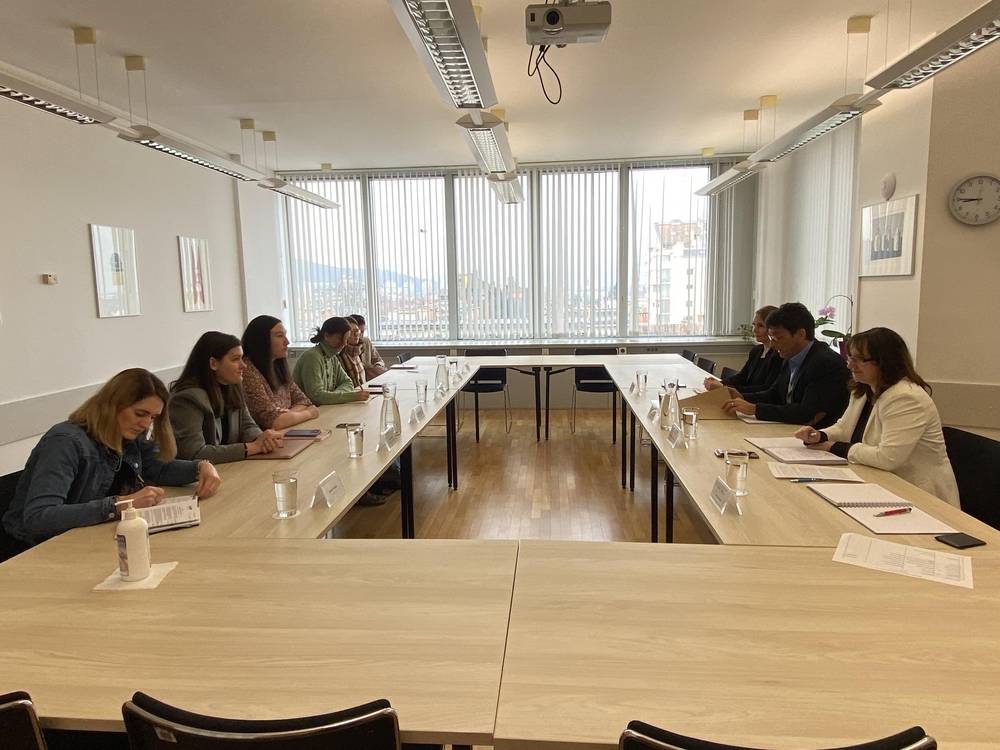Ahead of International Women’s Day, celebrated on 8 March, Human Rights Ombudsman Peter Svetina invited representatives of non-governmental organisations working in the field of women’s rights for a working meeting. They discussed the topics of preventing violence against women and domestic violence, equality of the sexes, and elimination of stereotypes and prejudice about social roles. The Ombudsman devotes special attention to these questions, since they involve one of the vulnerable groups of the population. He regularly writes on these topics in his annual reports, publicly brings attention to these questions, and addresses proposals and recommendations for change and improvement of the existing situation to competent bodies.
Manca Raušl, a representative of Društvo Ključ (Key Society), Ajda Černe from Združenje za Moč (Reclaim the Power Association), Metka Naglič, a representative of Amnesty International Slovenija, Maruša Kožman from Društvo Ženska svetovalnica (Women’s Counsellor Association), and Kaja Primorac and Ana Pavlič, representatives of Inštitut za proučevanje enakosti spolov (Gender Equality Research Institute), participated at the meeting with the Ombudsman.
At the meeting, Ombudsman Svetina emphasised that despite the great progress achieved in recent decades, significant differences remain between the sexes. Although women are successfully entering all spheres of public life, their voice frequently goes unheard. “In the labour market, women still predominate in poorly paid sectors, too few of them occupy leading positions. Unfortunately, violence against women is still very widespread, Slovenia faces a significant number of femicides. More needs to be done to ensure that the attitude towards women is based on respect of the equality of women and men and non-sexist stereotypes and behaviour. The institution of the Human Rights Ombudsman points to a few positive legislative measures in Slovenia; however, many fields remain that demand further attention for the improvement of the position of women and the achievement of gender equality. Even though we are equal before the law, research shows that we are far from equality in society. Numerous generations of women have fought for their rights, hence it is inadmissible to interfere with them,” warned Ombudsman Svetina at the meeting.
The Human Rights Ombudsman is particularly worried about the increase in the number of femicides in Slovenia. “According to data received from the Police in January 2022, in 2021 spouses or former spouses or intimate partners murdered six women in Slovenia. In 2020, the police dealt with ten such acts, while in 2019 there were five victims of femicide by an intimate partner. We are also witnessing cases of sexual harassment, which also occur in schools and universities. Therefore, I again call on the competent authorities to adopt a strategy addressing all forms of violence against women as soon as possible,” added Ombudsman Svetina. He expects that the people responsible also study and implement in Slovenia other recommendations by GREVIO (The Council of Europe’s Group of Experts on Action against Violence against Women and Domestic Violence), as well as the conclusions of the Committee on the Elimination of Discrimination against Women (CEDAW), which Slovenia adopted last week. The Ombudsman pointed out in particular that CEDAW calls upon Slovenia to ensure the collection and analysis of disaggregated data on all forms of violence against women and girls, including psychological, economic, and domestic violence, as well as cyber violence and femicide.
The participants agreed that there must be greater sensitivity in society in relation to violence, since this is a criminal act that must not be silently observed. For many years, the Ombudsman has been emphasising that officials, judges, prosecutors, police officers, and lawyers working with victims of violence should be constantly trained and educated about the effective recognition, treatment, and prevention of violence, so that victims can get appropriate help. We expect the competent bodies to prepare training programmes mandatory for anyone working with victims of violence as soon as possible,” said Ombudsman Svetina.
The representatives of NGOs agreed with the Ombudsman that a reform of the school system is needed and that the programmes need to systematically include contents dealing with human rights, gender equality, prevention of harmful stereotypes, and recognition of violence. Ana Pavlič from Inštitut za proučevanje enakosti spolov brought attention to the issue of women in rural areas who, due to economic dependence and lack of awareness of their rights, are very often victims of violence and various forms of abuse.
Representatives of Združenje za Moč and Društvo Ženska svetovalnica underlined that victims in procedures often experience inappropriate responses from the competent bodies dealing with their cases, which discourages many victims from reporting abuse. In their belief, female victims are frequently discriminated against in proceedings, which adds to their distress. Ombudsman Svetina believes that the state should reinforce free legal aid and expand it legally to make it available to anyone who needs it.
Manca Raušl, the representative of Društvo Ključ, introduced the issue of prostitution among young people. She stressed the need for preventive activities regarding raising awareness among young people about prostitution and other abuse. It is especially urgent to educate young people in educational institutions and youth centres where, in their belief, young people more frequently face prostitution or are forced into it. Metka Naglič from Amnesty International Slovenija added that young people should be educated about the new definition of the criminal act of rape and sexual abuse no later than in primary and secondary school. She especially warned about the poor health and care of Roma women and girls. The Ombudsman repeated that he has been striving for many years for drinking water and electricity to be provided in all Roma settlements.

![[Translate to English:] Varuh Svetina na srečanju z nevladnimi organizacijami [Translate to English:] Varuh Svetina na srečanju z nevladnimi organizacijami s področja enakopravnosti spolov](/fileadmin/_processed_/d/6/csm_Varuh_NVO_Dan_zena_1_914b50cd43.jpg)
![[Translate to English:] Varuh človekovih pravic Peter Svetina s sodelavkama [Translate to English:] Varuh človekovih pravic Peter Svetina z namestico dr. Dijono Možina Zupanc in pomočnico vodje Centra za človekove pravice dr. Simono Drenik Bavdeks na srečanju NVO o enakosti spolov](/fileadmin/_processed_/3/f/csm_Varuh_NVO_dan_zena_3_95d26c5ac2.jpg)